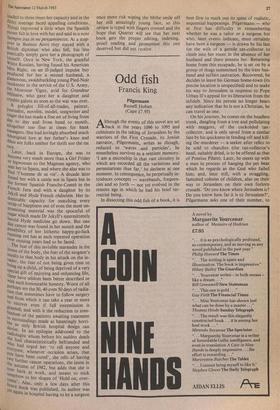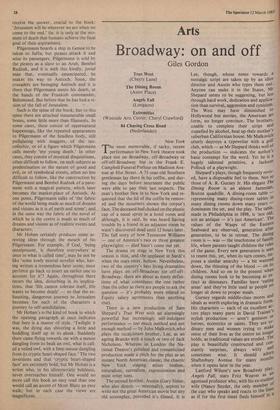Odd fish
Francis King
Pilgermann Russell Hoban (Cape £7.95)
A lthough the events of this novel are set
back in the years 1096 to 1095 and culminate in the taking of Jerusalem by the warriors of the First Crusade, its Jewish narrator, Pilgermann, writes as though, reduced to 'waves and particles', he nonetheless survives as a sentient memory. `I am a microchip in that vast circuitry in which are recorded all the variations and permutations thus far,' he declares at one moment. In consequence, he perpetually in- troduces concepts — wavebands, frequen- cies and so forth — not yet evolved in the remote age in which he had his brief ter- restrial being.
In dissecting this odd fish of a book, it is best first to mark out its spine of realistic, sequential happenings. Pilgermann — who at first has difficulty in remembering whether he was a tailor or a surgeon but who, later events indicate, must certainly have been a surgeon — is drawn by his lust for the wife of a gentile tax-collector to climb into her room in the absence of her husband and there possess her. Returning home from this escapade, he is set on by a group of thugs summoned by the irate hus- band and suffers castration. Recovered, he decides to leave his German home-town (its precise location is unspecified) and to make his way to Jerusalem in response to Pope Urban Ii's appeal for its liberation from the infidels. Since his person no longer bears any indication that he is not a Christian, he can travel as one.
On his journey, he comes on the headless trunk, dangling from a tree and pullulating with maggots, of the cuckolded tax- collector, and is only saved from a similar fate by his quickness in fending off and kill- ing the murderer — a seeker after relics to be sold to churches (the tax-collector's head, suitably dried, is to be offered as that of Pontius Pilate). Later, he meets up with a man in process of hanging the pet bear which he regards as the God who failed him; and, later still, with a straggling, famished column of children, also on their way to Jerusalem on their own forlorn crusade. 'Do you know where Jerusalem is? Do you know how far it is to Jerusalem?', Pilgermann asks one of their number, to receive the answer, crucial to the book: 'Jerusalem will be wherever we are when we come to the end.' (ie. it is only at the mo- ment of death that humans achieve the final goal of their aspirations).
Pilgermann boards a ship in Genoa to be taken to Jaffa; but pirates attack it and seize its passengers. Pilgermann is sold by the pirates as a slave to an Arab, Bembel Rudzuk, and it is with this kindly, jovial man that, eventually emancipated, he makes his way to Antioch. Soon, the crusaders are besieging Antioch and it is there that Pilgermann meets his death, at the hands of the Frankish commander, Behomond. But before that he has had a vi- sion of the fall of Jerusalem.
Such is the spine of the book; but to this spine there are attached innumerable small bones, some little more than filaments. In some cases, these consist of supernatural happenings, like the repeated appearances to Pilgermann of the headless body, still pullulating with maggots, of the tax- collector, or of a figure which Pilgermann calls merely 'my young death.' In other cases, they consist of mystical disquisitions, often difficult to follow, on such subjects as predestination or the nature of good and evil, or of symbolical events, often no less difficult to follow, like the construction by Pilgermann and Bembel Rudzuk of a pave- ment with a magical pattern, which later becomes the market-place of Antioch. At one point, Pilgermann talks of 'the fabric of the world being made as much of dreams and visions as it is of earth and stone'; and in the same way the fabric of the novel of which he is the centre is made as much of dreams and visions as of realistic events and characters.
Mr Hoban certainly produces some ar- resting ideas through the mouth of his Pilgermann. For example, if God, 'being omnipresent, is therefore everywhere at once in what is called time', may he not be like 'some lowly mortal novelist who, hav- ing written a tremendous later scene, must perforce go back to insert an earlier one to account for it'? Again, throughout there recurs the idea, disturbing in its implica- tions, that 'life cannot tolerate itself, life wants to become death' — so that the ex- hausting, dangerous journey to Jerusalem becomes for each of the characters a journey to self-annihilation.
Mr Hoban's is the kind of book in which the opening paragraph at once indicates that here is a master of style. 'Twilight it was, the dying day shivering a little and huddling itself up in its cloak. Suddenly there came flying towards me with a mouse dangling from its beak an owl, what is call- ed a veiled owl, with a limp mouse dangling from its cryptic heart-shaped face.' The two inversions and that 'cryptic heart-shaped face' are extremely bold; but Mr Hoban is a writer who, in his idiosyncratic boldness, never overreaches himself. One would no more call this book an easy read than one would call an ascent of Mont Blanc an easy walk; but in each case the views are magnificent.











































 Previous page
Previous page